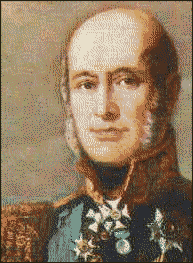General Barclay de Tolly, Michail, (1761-1818)
 A Livonian of Scottish descent, who joined the Russian army in 1776 as an ordinary soldier. He came to the attention of Prince Repnin in the war against the Turks in 1790, and he later also served in the Russo-Swedish war of 1788-90 and against the Poles. During the Winter campaign in Poland, 1806-07, Barclay de Tolly distinguished himself at the battles of Pultusk and Eylau, where he was seriously wounded as well. His bravery at Eylau earned him the respect of the Czar. He was promoted to Lieutenant General.
A Livonian of Scottish descent, who joined the Russian army in 1776 as an ordinary soldier. He came to the attention of Prince Repnin in the war against the Turks in 1790, and he later also served in the Russo-Swedish war of 1788-90 and against the Poles. During the Winter campaign in Poland, 1806-07, Barclay de Tolly distinguished himself at the battles of Pultusk and Eylau, where he was seriously wounded as well. His bravery at Eylau earned him the respect of the Czar. He was promoted to Lieutenant General.
In Finland in 1808 Barclay de Tolly commanded the corps of 7.000 troops in the east that fought against general Johan August Sandels with his Savolax Brigade. In september of that year, Sandels was finally forced to retreat and the Swedish armies retreated from Finland as a whole. In March of 1809, Barclay de Tolly led his troops over the ice to mainland Sweden and landed at Umeĺ. This was a daring operation, that ended with the Russian troops marching back to Finland though. The coup d'etat where king Gustav IV Adolf had been deposed had been conducted in Stockholm at this time and a peace treaty seemed near.
In 1810 Barclay de Tolly was appointed Minister of War, succeeding the incompetent Alexei Arakchev, and also became the commander of the First Army of the West in 1812. This double-appointment proved diffucult for him. Nonetheless, as Minister of War, Barclay de Tolly introduced many reforms that modernized the Russian army.
When Napoleon invaded Russia in 1812, Barclay de Tolly retreated further east with his First Army of the West, eventually linking up with the Second Army under Bagration at Smolensk. Here a major battle was fought, which the Russians lost mainly because of the mutual dislike between Barclay and Bagration. The new commander of the Russian army, Kutuzov, turned to fight the invading French. At Borodino on September 7 Barclay de Tolly commanded the right wing and there fought with skill. He resigned his command right after the battle though.
The next year he returned to service and commanded the Russian armies that went into Silesia to join with the Prussians. In 1813 and 1814 Barclay de Tolly accompanied the Czar in the campaigns against the French. He thereby took part in some of the greatest battles, Leipzig for instance. When Napoleon was finally beaten, Barclay de Tolly was made commander of the Russian forces occupying France. By 1815 he was made commander of the Russian army that was sent to fight Napoleon as he had returned from Elba. Waterloo ended the campaign before Barclay de Tolly reached France though. By then he was already Prince and field Marshal.
Barclay de Tolly died on May 26 1818 at Insterburg. He was a great administrator and reformer, rather than a splendid commander in the field. His reforms modernized Russia's army after the terrible years after Paul I and Arakchev.
Back to Biographies
© Göran Frilund 2000-03, All Rights Reserved.
If you've surfed onto this page from outside and there is no menu on the left,
CLICK HERE for the full Website.
 A Livonian of Scottish descent, who joined the Russian army in 1776 as an ordinary soldier. He came to the attention of Prince Repnin in the war against the Turks in 1790, and he later also served in the Russo-Swedish war of 1788-90 and against the Poles. During the Winter campaign in Poland, 1806-07, Barclay de Tolly distinguished himself at the battles of Pultusk and Eylau, where he was seriously wounded as well. His bravery at Eylau earned him the respect of the Czar. He was promoted to Lieutenant General.
A Livonian of Scottish descent, who joined the Russian army in 1776 as an ordinary soldier. He came to the attention of Prince Repnin in the war against the Turks in 1790, and he later also served in the Russo-Swedish war of 1788-90 and against the Poles. During the Winter campaign in Poland, 1806-07, Barclay de Tolly distinguished himself at the battles of Pultusk and Eylau, where he was seriously wounded as well. His bravery at Eylau earned him the respect of the Czar. He was promoted to Lieutenant General.